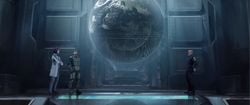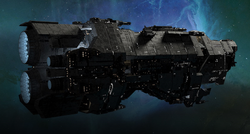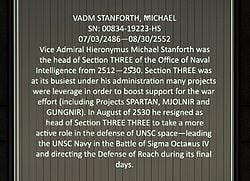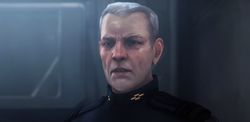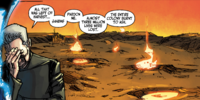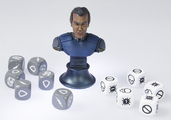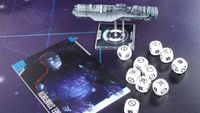Michael Stanforth: Difference between revisions
From Halopedia, the Halo wiki
NightHammer (talk | contribs) m (→Sources) |
|||
| Line 107: | Line 107: | ||
{{Reflist|2}} | {{Reflist|2}} | ||
[[Category:UNSC Naval | [[Category:Humans|Stanforth, Michael]] | ||
[[Category:UNSC Navy officers|Stanforth, Michael]] | |||
[[Category:Office of Naval Intelligence personnel|Stanforth, Michael]] | |||
Revision as of 12:10, February 1, 2016
- "That was a helluva piece of astrogation you pulled off. People noticed. Not to mention the morale boost it's given to the entire fleet. Now, that's the reason we're all here. We need a victory. It's been too damn long—us getting whittled to pieces by those alien bastards. This has got to be a win. No matter what it takes."
- — Michael Stanforth to Jacob Keyes, during the Battle of Sigma Octanus IV[1]
Vice Admiral Hieronymus "Harold" Michael Stanforth[note 1] (service number 00834-19223-HS)[2] was a flag officer of the UNSC Navy. He served as the head of the Office of Naval Intelligence's Section Three, its clandestine operations group, in the early years of the Human-Covenant War.[3][4] Aiding with the planning and implementation of the SPARTAN-II program, Stanforth had command of all Spartan-field operations early in the Covenant War. As the war continued, Stanforth left ONI to become the Commander of FLEETCOM Sector Three to aid in the defense of the Inner Colonies. After his victory at Sigma Octanus IV, Stanforth was charged with the defense of Reach, where he was ultimately killed when the Covenant broke through his final line of defense.[2]
Biography
Early career
By 2503, Stanforth had risen to the rank of admiral. On June 13 of that year, Stanforth sent a message from his ship, UNSC Leviathan, to then-Captain Preston Cole.[note 1] The Office of Naval Intelligence had discovered that Cole's wife Lyrenne Castilla was in fact an Insurrectionist and the commander of the Bellicose. Stanforth broke regulations by warning Cole three hours before Reach Central Command transmitted the orders for Castilla's arrest and Cole's recall. Stanforth told Cole: Template:Article Quote
Although Cole faced court martial and even capital punishment for possible treason, Stanforth and Cole's admiring public pressured ONI into releasing Cole with no charges. All that were involved were given strict orders to keep the affair classified.[5]
In 2507, Stanforth held the rank of captain, possibly due to demotion or because his position as an admiral was temporary.[note 1] During this same year he noticed the potential of Dr. Catherine Halsey, as she corrected Elias Carver's work while she was still a young upstart. This was the start of Stanforth's continuous aiding of Dr. Halsey with her project as her military counterpart and protecting her and the project from those that wanted to see it disbanded. During the next three years, the captain would rise in rank to become a vice admiral by December 2510.[6]
Career with ONI
At some point, Stanforth held a seat on the UNSC Security Council.[7] Stanforth was head of Section Three of the Office of Naval Intelligence from 2512 to 2530. He was involved with many classified projects including GUNGNIR, SPARTAN, and MJOLNIR.[3] Although he protected Halsey and her SPARTAN-II program from competitors and saboteurs, he also prevented her from accessing classified information such as information on the SPARTAN-III program.[6] In 2517, he refused to allow Dr. Halsey to use the diplomatic shuttle Han on her study for the Spartan-II candidates unless she had a military escort. Halsey chose then-Junior-Grade Lieutenant Jacob Keyes for the assignment.[8]
On November 2, 2525, Stanforth gave the Spartan-IIs their first briefing on the Covenant at the Reach FLEETCOM Military Complex. Stanforth's briefing included diagrams of Unggoy and Kig-Yar, as well as information on the fall of Harvest. He revealed that due to the UNSC-wide mobilization, the SPARTAN-II training would be accelerated and the Spartans would be given their MJOLNIR Powered Assault Armor earlier.[9] For the early years of the war, Stanforth had ultimate control of the Spartan-field operations.[2] On April 28, 2526, Stanforth requested for the Office of Naval Intelligence to repurpose all assets to aid the new war against the Covenant and to refocus all research on wartime strategy.[6]
On 2530, Stanforth resigned as the head of ONI's Section Three to take a more active role in the defense of the human colonies,[3] though he continued to support the SPARTAN-II program. His primary duties turned to bolstering the colonial defenses of the Inner Colonies.[2] In May 2531, then-Vice Admiral Cole sent a message from the UNSC Everest to Stanforth, who had become the UNSC Region One Commander at Reach CENTCOM. Cole outlined a series of recommendations intended to safeguard the location of Earth and other human colonies. These recommendations would form the foundation of the Cole Protocol. A nearly identical message, known as Hypodermic FXT-J, was sent to Admiral Margaret Parangosky, Commander-in-Chief of the Office of Naval Intelligence.[10]
By 2535, Stanforth had entered a committee discussing ONI budget on several projects, including the MJOLNIR project, forcing the project to take on a generational "Mark" system to categorize, prioritize and serialize the project in budgets.[6] In 2549, at Admiral Stanforth's insistence, the SPARTAN-II program was made public for morale purposes.[11]
Battle of Sigma Octanus IV
- Main article: Battle of Sigma Octanus IV
By 2552, Vice Admiral Stanforth commanded FLEETCOM Sector Three, which included the Sigma Octanus system. He was the first person who then-Commander Jacob Keyes informed via SATCOM of the impending Covenant invasion of Sigma Octanus IV.[12] To aid in the defense of the planet, Stanforth had amassed four dozen UNSC ships in orbit over Sigma Octanus IV—including two carriers, a refit station, and numerous cruisers, destroyers, and frigates.[13] After Keyes' impressive tactical maneuver that led to the destruction of three Covenant vessels and the forced retreat of a carrier, Stanforth went aboard UNSC Iroquois to personally congratulate Keyes and promote him to the rank of captain. Later, at Keyes' request, Stanforth had Ensign William Lovell transferred to Iroquois.[14]
Six hours later, a second Covenant fleet had returned to the Sigma Octanus system. He led the UNSC forces during the battle from the flagship Marathon-class heavy cruiser UNSC Leviathan. Stanforth had his fleet hold position between Sigma Octanus IV and its natural satellite. While it allowed for the fleet to fire all their MAC guns simultaneously at the Covenant fleet with a single massive volley, the formation restricted the mobility of the fleet and would leave them unable to evade the extremely accurate Covenant plasma torpedoes. As the UNSC and Covenant vessels engaged each other, the Covenant fleet was heavily damaged from the UNSC's opening MAC salvo. Stanforth then gave an order to all ships commanding them not to fire. He told the ships to hold their positions and then the UNSC Cradle moved in front of the UNSC formation, acting as a sacrificial shield, and absorbed the Covenant fleet's first salvo. With Cradle destroyed and the Covenant attack deflected, Stanforth ordered for all ships to break formation and attack before the Covenant fleet recharged its weapons.[15]
During the battle, UNSC Iroquois left the engagement to destroy a Covenant stealth ship in orbit over the planet. During this period of the battle, Stanforth was slightly injured as a result of damage to the Leviathan. Afterward, Keyes contacted him and requested the admiral's aid in destroying a Covenant destroyer that was preparing to engage Iroquois. Stanforth demanded to know why Keyes left the battle, Keyes informed the admiral about the incident with the stealth ship as well as his discovery of a Covenant transmission that held the reason for the Covenant's assault on Sigma Octanus. Accepting Keyes' explanation, Stanforth ordered the remaining eight UNSC ships to fire upon the destroyer, though it survived the volley and continued on its course toward Iroquois, only to break off and leave the system along with the rest of the Covenant fleet.[16] As the rest of the Covenant fleet retreated, Stanforth considered the battle a victory that would raise morale.[17]In a decision he would come to regret, Stanforth gave Dr. Halsey the after-action report on the battle. Later, he was afraid that she might find out about the Forerunner crystal found there.[6]
Following the battle, on July 18, 2552, Stanforth had requested the crew of his flagship transferred to Coenwulf as Leviathan required at least two months of repair work. Stanforth sent a post-battle report to Admiral Margaret Parangosky, estimating that it would take up to a dozen years to repair the damages done to the planet's surface. He planned to return to HIGHCOM Facility Bravo-6 in Sydney, Australia on Earth to "make rounds".[18] However, Parangosky suggested for him to head for Camp Hathcock at Reach instead, believing that the Epsilon Eridani system would be attacked by the Covenant in the following weeks. She then suggested that Stanforth should consider initiating Operation: RED FLAG—in the event that the Covenant attacked Reach.[19]
Fall of Reach
- Main article: Fall of Reach
Stanforth ordered Keyes to return with him to Reach for debriefing.[20] By August 1, 2552, Stanforth had returned to Epsilon Eridani, along with half of his battle group that was present at Sigma Octanus. He stated that he was concerned that Parangosky was considering RED FLAG, and stated that if used on Reach, the human death count and military sacrifice would be astounding and that it would become a revolutionary point in the war. Despite his concerns, Stanforth attached the document detailing the specifics of the operation with his message to Parangosky.[21] As the Covenant onslaught on the Epsilon Eridani system began, Stanforth commanded naval forces throughout the system. On August 12, 2552, Stanforth's Battle Group Leviathan was now in full capacity and had returned to Reach for emergency repairs and refit.[6] While the battle group was repaired, Stanforth and Keyes arrived at Camp Hathcock in the Highland Mountains on Reach for debriefing. Shortly after, they returned to their respective vessels within the battle group.[22] On August 27, 2552, Stanforth sent a message to Parangosky detailing his guilt about keeping half of Reach in the dark about the Covenant invasion. He later revealed the key assets and staff involved in RED FLAG and expressed amazement at the Career Service Vitae belonging to John-117.[23] That day, Stanforth had Halsey brief the SPARTAN-IIs on Operation: RED FLAG.[24]
On August 30, 2552, Vice Admiral Stanforth backed Dr. Halsey's official protest that was sent to UNSC Burden of Proof that was related to Colonel James Ackerson's possible involvement with the sabotage of Halsey's field test with John-117 and Cortana.[6] Stanforth had the SPARTAN-IIs affiliated with RED FLAG board UNSC Pillar of Autumn, but ensured that none of them used their COM unit to prevent anyone else from discovering the operation.[25] The same day, Stanforth led the remains of the Epsilon Eridani Fleet over Reach from Leviathan, though he was killed when the Covenant fleet broke through his final line of defense and destroyed his ship.[2][3]
Personality and traits
Michael Stanforth was a competent fleet commander who did not fear leading the ships under his command from the front.[2] Stanforth displayed a cold and distant demeanor before his subordinates. Nonetheless, Stanforth was considered to be a truly selfless leader who always put the interests of his troops ahead of his own.[7] Considered a humanist at heart, he had a close, personal friendship with Jacob Keyes.[26] Stanforth held respect for Keyes and John-117, believing both to be remarkable individuals.[23] Keyes noted that Stanforth was known for being reasonable and intelligent.[27] Stanforth also held close working relationships with Margaret Parangosky and Preston Cole. When he realized that Cole's wife, Lyrenne Castilla, was an insurgent, he broke regulation and warned him to prevent ONI from giving Cole a court martial. He respected Doctor Catherine Halsey and had been one of the few to notice her potential when she was young. He would often help her by protecting her projects from competitors, including Colonel James Ackerson. When Operation: RED FLAG was deemed appropriate for initiation at Reach, Stanforth was willing to include Dr. Halsey in it—despite Admiral Parangosky's reluctance.[21]
Stanforth did not particularly care to show off his service medals on his naval dress uniform. In most situations, he preferred to wear a subdued black dress uniform without displaying any medals or campaign ribbons. Only in rare cases, such as when he sat on the UNSC Security Council or when he briefed the leadership of the Unified Earth Government, did Stanforth don a white dress with awards. Stanforth's austere appearance was adopted by many of his aides, subordinates, and protégés, much to the annoyance of the more image-conscious Fleet Admiral Lord Terrence Hood. In public, Stanforth was unwaveringly rigorous in his discipline and adherence to military protocols and formalities. However, Stanforth occasionally indulged in Martian whiskey and Sweet William cigars while relaxing in private.[7] Stanforth suffered from "space walk" due to his long terms in microgravity.[28]
Production notes
Discrepancies
Name
The memorial in Halo 3: ODST gives Stanforth's first name as "Hieronymus", while The Impossible Life and the Possible Death of Preston J. Cole identifies him as "Harold". This was likely due to a lack of communication between Bungie and the short story's author, Eric Nylund. Simply put, both parties gave differing explanations for the H in his service number: he is referred to by his middle name, Michael, in Halo: The Fall of Reach, while his service number is 00834-19223-HS. The Data Drop written by 343 Industries reiterates his first name as Harold on one occasion, yet he is otherwise consistently referred to as Hieronymus. His service number is listed consistently across these different media, indicating that "Harold" Stanforth in The Impossible Life and the Possible Death of Preston J. Cole is indeed meant to be the same person as Michael Stanforth in The Fall of Reach and the ONI memorial plaque.
Age
The memorial lists Stanforth's date of birth as July 3, 2486.[3] The 2010 edition of Halo: The Fall of Reach was modified to accommodate this; whereas Stanforth was originally mentioned as being ten years Dr. Halsey's senior, he is stated to be six years older than Halsey in the new edition.[29] If the timeline of his life from Halo: Evolutions were taken at face value, this would mean he reached the rank of admiral at seventeen years old. Despite the discrepancy, 343 Industries has reiterated the date of birth given in the memorial as being canonical.[30]
According to the short story, Admiral Stanforth commanded a vessel known as the Leviathan in June 2503. However, as the Marathon class was designed as a replacement for the Halcyon class, (itself designed in 2510), this particular vessel was likely the namesake of Stanforth's later flagship: see here for more information.
As mentioned above, it is difficult to consider the 2486 figure as factually accurate, as it would make Stanforth far too young. His biological age would be further reduced by the extensive spans of cryosleep during slipspace jumps, yet his depiction in the Halo: Fall of Reach comic series would suggest an age decades greater than his claimed nominal age of 39. If he were an admiral in 2510, he would most likely have been middle-aged at the time. If this were the case, Vice Admiral Stanforth would have been nearly a century old near the end of the Human-Covenant War. This is not out of the question, however, as 26th-century medical advances and cryosleep during slipspace travel could very well may extend human longevity decades beyond what modern science allows. For example, Admiral Margaret Parangosky, the former Commander in Chief of ONI, served at least until the age of 92, and the combination of medical science and cryosleep have been mentioned as being capable of pushing back the effects of aging for at least two decades.[31]
Rank
The strangest incongruity in Stanforth's background is his rank. Even if he were demoted between 2503 and 2507, it is extremely unlikely that his rank would be decreased four grades (from O-10 to O-6) for any reason. No source suggests a disciplinary infraction of any kind, and even if his rank of admiral were temporary (perhaps honorary), he probably would not have received such a prominent ad hoc position in the first place. Dr. Halsey's personal journal makes no mention of Stanforth's past as a flag officer: he is referred to as "the Captain" in entries dated between 2507 and December 2510, after which he is called "the Vice Admiral".
Gallery
Stanforth in Halo: Fall of Reach
A bust of Michael Stanforth in Halo: Fleet Battles
List of appearances
- Halo: The Fall of Reach (First appearance)
- Halo: The Flood (Mentioned only)
- Halo 3: ODST (Mentioned only)
- Halo: Evolutions - Essential Tales of the Halo Universe
- Halo: Reach
- Dr. Halsey's personal journal (Mentioned only)
- Halo: Fall of Reach
- Halo: Fleet Battles
- Halo: The Fall of Reach - The Animated Series
Note
- ^ a b c See this section.
Sources
- ^ Halo: The Fall of Reach, page 186 (2010)
- ^ a b c d e f Cite error: Invalid
<ref>tag; no text was provided for refs namedMike - ^ a b c d e Halo 3: ODST, multiplayer level Alpha Site: ONI Memorial
- ^ Halo: The Fall of Reach, page 33 (2010)
- ^ Halo: Evolutions, "The Impossible Life and the Possible Death of Preston J. Cole", pages 454-458
- ^ a b c d e f g Halo: Reach, Dr. Halsey's personal journal
- ^ a b c Halo: Fleet Battles, Campaign Guide - page 29
- ^ Halo: The Fall of Reach, page 33 (2010)
- ^ Halo: The Fall of Reach, pages 118-121 (2010)
- ^ Halo: Evolutions, "The Impossible Life and the Possible Death of Preston J. Cole", page 467
- ^ Halo: The Fall of Reach, page 216 (2001); page 249 (2010)
- ^ Halo: The Fall of Reach, pages 167-168 (2010)
- ^ Halo: The Fall of Reach, page 181 (2010)
- ^ Halo: The Fall of Reach, pages 186-188 (2010)
- ^ Halo: The Fall of Reach, pages 215-222 (2010)
- ^ Halo: The Fall of Reach, pages 227-229 (2010)
- ^ Halo: The Fall of Reach, page 242 (2010)
- ^ Data Drop, #2
- ^ Data Drop, #3
- ^ Halo: The Fall of Reach, page 245 (2010)
- ^ a b Data Drop, #4
- ^ Halo: The Fall of Reach, page 252 (2010)
- ^ a b Data Drop, #5
- ^ Halo: The Fall of Reach, page 274 (2010)
- ^ Halo: The Fall of Reach, page 313 (2010)
- ^ Halo Encyclopedia, page 74 (2011)
- ^ Halo: The Fall of Reach, page 167 (2010)
- ^ Halo: The Fall of Reach, page 117 (2010)
- ^ Halo: The Fall of Reach, page 95 (2001); page 117 (2010)
- ^ Cite error: Invalid
<ref>tag; no text was provided for refs namedclarity - ^ Halo: Evolutions,"The Impossible Life and the Possible Death of Preston J. Cole", pages 485-486
